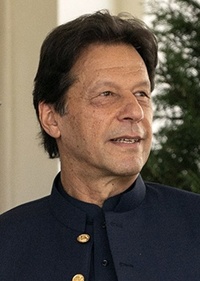
Imran Khan
Actor
Imran Ahmed Khan Niazi (; born 5 October 1952) is the 22nd and current Prime Minister of Pakistan and the chairman of the Pakistan Tehreek-e-Insaf (PTI). Before entering politics, Khan was an international cricketer and captain of the Pakistan national cricket team, which he led to victory in the 1992 Cricket World Cup. Khan was born to a Pashtun family of Mianwali in Lahore in 1952; he was educated at Aitchison College in Lahore, then the Royal Grammar School Worcester in Worcester, and later at Keble College, Oxford. He started playing cricket at age 13, and made his debut for the Pakistan national cricket team at age 18, during a 1971 Test series against England. After graduating from Oxford, he made his home debut for Pakistan in 1976, and played until 1992. He also served as the team's captain intermittently between 1982 and 1992, notably leading Pakistan to victory at the 1992 Cricket World Cup, Pakistan's first and only victory in the competition. Khan retired from cricket in 1992, as one of Pakistan's most successful players. In total he made 3,807 runs and took 362 wickets in Test cricket, and is one of eight world cricketers to have achieved an 'All-rounder's Triple' in Test matches. After retiring, he faced scandal after admitting to tampering with the ball with a bottle top in his youth. In 2003, he became a coach in Pakistan's domestic cricket circuit, and in 2010, he was inducted into the ICC Cricket Hall of Fame. In 1991, he launched a fundraising campaign to set up a cancer hospital in memory of his mother. He raised $25 million to set up a hospital in Lahore in 1994, and set up a second hospital in Peshawar in 2015. Khan remains a prominent philanthropist and commentator, having expanded the Shaukat Khanum Memorial Cancer Hospital to also include a research centre, and founded Namal College in 2008. Khan also served as the chancellor of the University of Bradford between 2005 and 2014, and was the recipient of an honorary fellowship by the Royal College of Physicians in 2012. In April 1996, Khan founded the Pakistan Tehreek-e-Insaf (lit: Pakistan Movement for Justice), a centrist political party, and became the party's national leader. Khan contested for a seat in the National Assembly in October 2002 and served as an opposition member from Mianwali until 2007. He was again elected to the parliament in the 2013 elections, when his party emerged as the second largest in the country by popular vote. Khan served as the parliamentary leader of the party and led the third-largest block of parliamentarians in the National Assembly from 2013 to 2018. His party also led a coalition government in the north-western province of Khyber Pakhtunkhwa. In the 2018 general elections, his party won the largest number of seats and defeated the ruling PML-N, bringing Khan to premiership and the PTI into federal government for the first time.
Imran Ahmed Khan Niazi (; born 5 October 1952) is the 22nd and current Prime Minister of Pakistan and the chairman of the Pakistan Tehreek-e-Insaf (PTI). Before entering politics, Khan was an international cricketer and captain of the Pakistan national cricket team, which he led to victory in the 1992 Cricket World Cup.
Khan was born to a Pashtun family of Mianwali in Lahore in 1952; he was educated at Aitchison College in Lahore, then the Royal Grammar School Worcester in Worcester, and later at Keble College, Oxford. He started playing cricket at age 13, and made his debut for the Pakistan national cricket team at age 18, during a 1971 Test series against England. After graduating from Oxford, he made his home debut for Pakistan in 1976, and played until 1992. He also served as the team's captain intermittently between 1982 and 1992, notably leading Pakistan to victory at the 1992 Cricket World Cup, Pakistan's first and only victory in the competition.
Khan retired from cricket in 1992, as one of Pakistan's most successful players. In total he made 3,807 runs and took 362 wickets in Test cricket, and is one of eight world cricketers to have achieved an 'All-rounder's Triple' in Test matches. After retiring, he faced scandal after admitting to tampering with the ball with a bottle top in his youth. In 2003, he became a coach in Pakistan's domestic cricket circuit, and in 2010, he was inducted into the ICC Cricket Hall of Fame.
In 1991, he launched a fundraising campaign to set up a cancer hospital in memory of his mother. He raised $25 million to set up a hospital in Lahore in 1994, and set up a second hospital in Peshawar in 2015. Khan remains a prominent philanthropist and commentator, having expanded the Shaukat Khanum Memorial Cancer Hospital to also include a research centre, and founded Namal College in 2008. Khan also served as the chancellor of the University of Bradford between 2005 and 2014, and was the recipient of an honorary fellowship by the Royal College of Physicians in 2012.
In April 1996, Khan founded the Pakistan Tehreek-e-Insaf (lit: Pakistan Movement for Justice), a centrist political party, and became the party's national leader. Khan contested for a seat in the National Assembly in October 2002 and served as an opposition member from Mianwali until 2007. He was again elected to the parliament in the 2013 elections, when his party emerged as the second largest in the country by popular vote. Khan served as the parliamentary leader of the party and led the third-largest block of parliamentarians in the National Assembly from 2013 to 2018. His party also led a coalition government in the north-western province of Khyber Pakhtunkhwa. In the 2018 general elections, his party won the largest number of seats and defeated the ruling PML-N, bringing Khan to premiership and the PTI into federal government for the first time.
Imran Khan Movies & TV Shows - Watch Online










